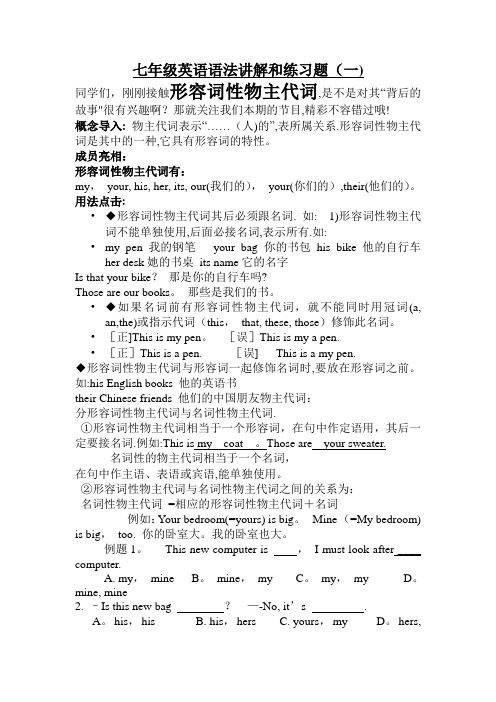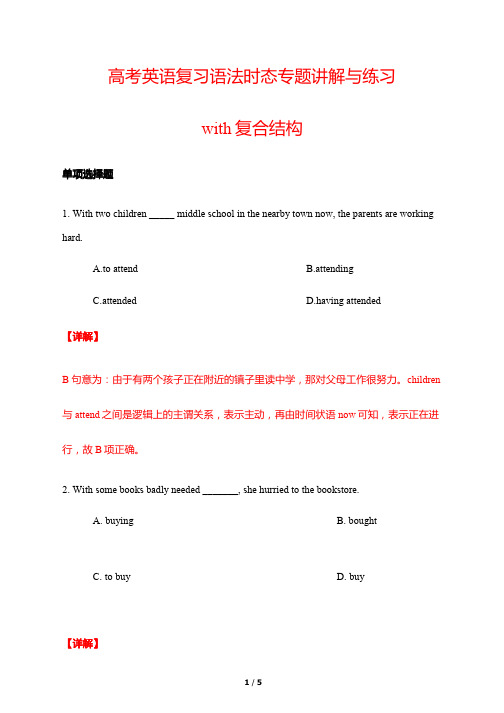语法讲解和练习(一)
深圳牛津版七年级上Chapter 1 语法讲解、练习及答案

年级______ 姓名___________七年级Chapter 1 语法讲解及练习一、连词用法(and but or so)英语中,连词是连接单词、短语或者句子的一种虚词,在句中不单独做任何成分。
1.and的用法并列连词and意为“和,又”,表示并列关系,常用来连接表示对等成分的单词、短语或者句子,表示意思的顺延或增补。
例如:(1)Our Maths teacher is kind and heipful.(2)I went to the supermarket and bought some vegetables this morning. (3)Her uncle gave her a new bike as her birthday present and she liked it very much.and用作并列连词有多重含义,除了表示并列关系外,还可以表示目的(and之后)和条件(and之前)等关系。
例如:(4)Come and see my family.来见见我家人。
(see表示目的)(5)Be careful,and you will make fewer mistakes.如果仔细,你犯的错误就少)(Be careful表示条件)2.but的用法并列连词but意为“但是”,表示转折关系,所连接的成分意思相反或相对。
例如:(1)Our school is small but beatiful.我们学校虽然小但很漂亮。
(连接两个形容词,意思相对)(2)The car is very old but it runs very fast.虽然小汽车旧了,但跑得很快。
( 3 ) Every is here but Tom .除了汤姆,其余的都在这里。
(除了的意思)3.or的用法并列连词or意为“或者”,表示选择关系。
例如:(1)Which do you like better ,juice or Coke?接两个名词)(2)Do you often go to school on foot or by bike?(3)You can stay here, or you can leave.另外,在否定句中否定并列成分时,用or,而不用and。
初中英语语法人称代词物主代词反身代词讲解与练习

复数
ourselves 我们自己 yourselves 你们自己
themselves 他们自己
【中考考点】 1. I hope you will enjoy yourself on the trip. 2. You should take care of the matter yourself.
【考点速记】 1.反身代词常用在by, enjoy, help, hurt, teach,wash, look after, learn, leave等词后作宾语,表示动作落到主语本身。
4. Mum, this is__D___teacher. _____name is Li Hui.
A. your, My
B. his, Your
C. you, His
D. my, His
5. “I”__A___a word (单词) and a letter(字母).
A. is B. am C. be
_Y_o_u_,__h_e_ and __I__ have all got a hundred points in this exam. 你、他和我在这次考试中都考了一百分。
_W__e_,_y_o_u_ and _th__ey_ are all Chinese. 我们、你们和他们都是中国人。
物主代词
9. __S_h_e___is my English teacher. (her) 10. This is__m__y___(I ) backpack. And that is__y_o_u_r_s_. (you)
人称代词与物主代词巩固练习
二、选择填空。
1. Her name __A___Gina.
—No, it’s__C___.
形容词性物主代词和名词性物主代词讲解练习及答案

七年级英语语法讲解和练习题(一)同学们,刚刚接触形容词性物主代词,是不是对其“背后的故事"很有兴趣啊?那就关注我们本期的节目,精彩不容错过哦!概念导入:物主代词表示“……(人)的”,表所属关系.形容词性物主代词是其中的一种,它具有形容词的特性。
成员亮相:形容词性物主代词有:my,your, his, her, its, our(我们的),your(你们的),their(他们的)。
用法点击:•◆形容词性物主代词其后必须跟名词. 如:1)形容词性物主代词不能单独使用,后面必接名词,表示所有.如:•my pen我的钢笔your bag你的书包his bike他的自行车her desk她的书桌its name它的名字Is that your bike?那是你的自行车吗?Those are our books。
那些是我们的书。
•◆如果名词前有形容词性物主代词,就不能同时用冠词(a, an,the)或指示代词(this,that, these, those)修饰此名词。
•[正]This is my pen。
[误]This is my a pen.•[正]This is a pen. [误] This is a my pen.◆形容词性物主代词与形容词一起修饰名词时,要放在形容词之前。
如:his English books 他的英语书their Chinese friends 他们的中国朋友物主代词:分形容词性物主代词与名词性物主代词.①形容词性物主代词相当于一个形容词,在句中作定语用,其后一定要接名词.例如:This is my coat 。
Those are your sweater.名词性的物主代词相当于一个名词,在句中作主语、表语或宾语,能单独使用。
②形容词性物主代词与名词性物主代词之间的关系为:名词性物主代词=相应的形容词性物主代词+名词例如:Your bedroom(=yours) is big。
高考英语复习语法时态专题讲解与练习1---with复合结构(解析版)

高考英语复习语法时态专题讲解与练习with复合结构单项选择题1. With two children _____ middle school in the nearby town now, the parents are working hard.A.to attendB.attendingC.attendedD.having attended【详解】B 句意为:由于有两个孩子正在附近的镇子里读中学,那对父母工作很努力。
children 与attend之间是逻辑上的主谓关系,表示主动,再由时间状语now可知,表示正在进行,故B项正确。
2. With some books badly needed _______, she hurried to the bookstore.A. buyingB. boughtC. to buyD. buy【详解】C 句意:有一些书要买,她急匆匆地去了书店。
在with复合结构中,不定式表将来。
故答案为C。
3. The old couple often take a walk after supper in the park with their pet dog them.A.to followB.followingC.followedD.follows 【详解】B句意:这老两口常常在晚饭后到公园里散步,他们的宠物狗则在后面跟着。
在with 复合结构中,their pet dog与follow是主谓关系,因此这里用现在分词作宾补。
4. The living room is clean and tidy, with a dining table already __________ for a meal to be cooked.A. laidB. layingC. to layD. being laid【详解】A lay与a dining table为动宾关系,再由already可知非谓语所表示动作已经完成。
初中英语倒装句讲解及练习(一)

初中英语倒装句讲解及练习(一)初中英语倒装句讲解及练习倒装是英语中一种语法现象,是将主语和谓语的顺序颠倒过来,以使语法更加紧凑或形成特殊的语气或语态等。
在英语中,倒装是一种常见的表达方式,尤其是在否定句、疑问句、条件句和地点状语从句中。
下面我们来详细了解一下各类倒装句的用法及注意点。
1. 完全倒装句在句子开头使用倒装,即将谓语动词放在主语前面,句子结构为“谓语动词+主语”,称为完全倒装句。
完全倒装句常用于以下情况:1)表示地点状语的倒装例如:In front of the classroom stood the teacher.On the wall hung a beautiful painting.2)表示引出一个状语从句或非限定性关系从句的倒装例如:In order that he might get high marks, did John study harder.However, little did they know that the show was about tostart.3)表示只有状语从句或介词短语时的倒装例如:Never before had I seen such a beautiful view.Under no circumstances should you give up.2. 部分倒装句在句子中将助动词或情态动词与主语颠倒,句子结构为“助动词/情态动词+主语+谓语”,称为部分倒装句。
部分倒装句常用于以下情况:1)表示祈使句例如:Stand up, please.Don't touch that, will you?2)表示反问例如:You're a teacher, aren't you?He won't come, will he?3)表示强调例如:Only by working hard can you achieve your goal.Not only did he write an essay, but he also gave a speech.练习:1. Only in this way _____. A. can you succeed B. you succeed C. you can succeed D. will you succeed2. On the wall _____a beautiful painting. A. hung B. hanged3. Never _____ he seen such a beautiful view. A. beforehad B. had before4. Under no circumstances should you ____ up. A. giveB. givingC. to giveD. gave5. _____ anyone seen my keys? A. Have B. Has C. Do6. At no time _____ his mother worried about him. A. didB. hasC. had7. If you need any help, _____. A. come to me don'thesitate B. don't hesitate you can come to me C. hesitatedon't come to me D. don't hesitate to come to me8. Don't touch that cup, ____? A. will you B. won'tyou9. He _____ never _____ to China again. A. will, goB. won't, goC. doesn't, goD. hasn't, been10. Mary's parents _____ not at home, _____ they? A. are, are B. are, aren't C. aren't, are D. aren't, aren't答案:1.A2.A3.A4.A5.A6.A7.D8.A9.B 10.C。
人教版八年级上册一般过去时语法讲解及练习(含答案)

一般过去时语法讲练一、含义一般过去时表示过去某个时间里发生的动作或状态;过去习惯性、经常性的动作、行为。
二、用法(一)表示过去某个时间或某一段时间发生的动作或存在的状态①平时经常的或习惯性的动作,通常用一个实义动词来描述。
She came back home after dinner yesterday.I had a word with Julia this morningHe was in Shanghai last year.They were young four years ago.(二)表示过去经常或反复发生的动作He got up at 7 every day.Mrs. Peter always carried an umbrella.常用used to/would表示过去习惯性动作:He used to visit his mother once a week.The old man would sit on a bench in the quiet park and look at others for hours without doing anything or talking to anybody.(三)有时可替代一般现在时,表达一种婉转、客气、礼貌、商量的语气Would you mind my siting here?(四)时间标志词yesterday, the day before yesterday, last week/year/summer , two/three/days/weeks ago, that morning/winter/day/year, those days/years, at that time/moment, in 1990, just now, in the old days, two hours later, one day, when I was …years old/when I was young…三、句型结构(一)be动词四、动词过去式(过去式)的变化规则(一)直接加edlisten-listened visit-visited walk-walked(二)以e结尾,直接加dlive-lived hope-hoped(三)以辅音字母加y结尾的动词,变y为i加edcarry-carried study-studied(四)以重读闭音节结尾,如末尾只有一个辅音字母,双写辅音字母加edshop-shopped stop-stopped drop-dropped plan-planned fit-fitted prefer-preferredI lived ( live )in Shanghai in 2003.(五)不规则动词过去式的变化需特殊记忆buy-bought go-went read-readI read (read) English yesterday morning.【注意事项】1、一般过去时只说明过去的事情,不强调动作对现在的影响。
初中英语语法名词用法讲解及专项练习
初中英语语法名词⽤法讲解及专项练习初中英语语法名词⽤法讲解及专项练习【考点讲解】⼀、名词的分类⼆、可数名词与不可数名词(⼀) 可数名词名词分为可数和不可数名词。
物质名词与抽象名词⼀般属于不可数名词,它们只有单数形式;个体名词和集体名词⼀般是可数名词,通常有单数和复数两种形式。
1. 单数变复数的规则【注】①常见的以o 结尾要加es 的有如下⼏个:hero, tomato, potato ,可记为“英雄爱吃西红柿和⼟⾖”。
剩余以o 为结尾的加s :如photo, zoo, piano等②以f 或fe 结尾变f 或fe 为v+es 的词有如下:⼩偷的妻⼦⽤⼑把狼劈成两半,⼀半放在书架上,⼀半放在树叶上2. 不规则复数形式(1) 元⾳或词尾发⽣变化:child- , man- , woman-_________, foot- , tooth- , mouse-policeman -___________, Frenchman-_________Englishman-(2) 单复数形式相同: (3) 形式为复数,意思为复数:people ,police(4) 形式为复数,意思为单数:news, maths, physics(5) 只能⽤复数形式:trousers, shoes, glasses ……【注】○1man,woman作定语修饰别的名词时,要把man,woman和其他部分都变成复数,如man teacher –,woman doctor –_____________;○2但是其他合成名词,只需把其中⼼词变成复数形式。
如:shoe factory- , banana tree-3. “某国⼈”的复数形式“中⽇不变英法变,其余s加后边”(⼆)不可数名词不可数名词包括物质名词和抽象名词,⼀般没有复数形式1. 物质名词有water, rice, tea, milk, chicken(鸡⾁), fish(鱼⾁), food, fruit, beef, orange(橙汁), sugar, salt, paper(纸), porridge, bread, sand, juice,chalk等;抽象名词有news, music, time(时间), information等;2. 在英语中,不可数名词如果要表⽰“量”的概念,可以⽤以下两种⽅法:(1) ⽤much, a little, a lot of/lots of, some, any等表⽰多少,例如:a lot of money / some milk / any water / much snow(2) ⽤“a piece / glass / cup / bottle / bag of+不可数名词”或“数词pieces / glasses / cups / bottles / bags of+不可数名词”这类定语,例如:a piece of paper ( wood / bread) →a bottle of orange →a glass of wate r →a cup of tea →a bag of rice →3. 不可数名词不能与数词或不定冠词a/an连⽤;4. 注意有些名词既可作可数名词,也可作不可数名词,此时中⽂意思有区别。
八年级上册英语语法知识点讲解和练习(学生用)
八年级上册英语语法知识点讲解和练习(一)一般将来时一般将来时表示将来某个时间要发生的动作或者存在的状态。
通常与表示将来的时间状语连用,如tomorrow, the day after tomorrow, next year, next month, next week, in 100 years 等。
be going to do (动词原形)结构:表示打算、准备做的事情或者肯定要发生的事情。
如:It is going to rain, will do结构表示将来的用法:Do you think it will rain?You will feel better after a good rest.I will borrow a book from our school library tomorrow.What will she do tomorrow?基本构成如下:一般疑问句构成:(1)wi 11+主语+do."? Will Sarah come to visit me next Sunday?(2)there be 结构的一般疑问句:Will there + be …?Will there be fewer trees? Yes, there will. / No, there won’ t否定句构成:will + not (won’t) +doSarah won’ t come to visit me next Sunday.特殊疑问句构成:特殊疑问词+will+主语+…? What will Sarah do next Sunday?练一练根据例句,用will改写下列各句例:I don, t feel well today, (be better tomorrow)I’ll be better tomorrow.1.Gina has six classes today, (have a lot of homework tonight)2.I’ m tired now. (sleep later)3.My parents need a new car. (buy one soon)4.We can’ t leave right now. (leave a little later)5.The weather is awful today, (be better tomorrow)(二)should 的用法:should用来提出建议和忠告,后边加动词原形,否定句直接在should后边加not. 例如:I think you should eat less junk food.我认为你应该少吃垃圾食品。
(完整版)高中英语语法讲解与练习
(完整版)高中英语语法讲解与练习<< 语法 >> 学案第一讲冠词口诀: 冠词分为定冠、不定冠,不定冠词a和an,“—”的含义表泛指表示特指要用the,次序、方位、最高级世上物体独一个,人或事物再次提以下情况冠词免,学科球类三顿饭名词复数表泛指,季节星期月份前不定冠词a/an的用法:不定冠词有"a和an"两种形式。
"a"用在以辅音开头的词前,"an"用在以元音开头的词前。
判断一个词是以元音开头还是以辅音开头,是根据读音而不是根据字母。
一般情况下,开头字母是a、e、f、h、j、l、m、n、o、r、s、x前用不定冠词an。
1.在可数名词单数形式前表示"一":There is a tiger in the zoo.动物园里有一只老虎。
2. 表示一类人和东西 A tiger can be dangerous.老虎可能有危害性。
3. 表示"某一个"的意思A gentleman wants to see you.有一位先生要见你。
4. 表示"同一"的意思They are nearly of an age.他们几乎同岁。
5. 表示"每一"的意思We go swimming four times a week.我们每周去游泳四次。
6. 在作表语的单数可数名词前,表示身份、职业My mother is a teacher.我妈是教师。
7. 第一次提到的人或事物,但不特别指明是哪一个Long long ago there was an old king who had a very beautiful daughter.很久很久以前,有一个年老的国王,他有一个非常美丽的女儿。
8. 在英国英语中,以"h"开头的多音节词,如第一个音节不重读,其前亦可用"an" There is a/an hotel near here.这附近有一家旅馆。
牛津译林版七年级英语上册Unit 1语法讲解及练习
牛津译林版七年级英语上册Unit 1语法讲解及练习一.重点语法:一般现在时1. 定义:表示现在经常发生的事情2. 时间状语:often, usually, always, sometimes, never, every (Sunday, morning, week...), on Sundays3. 基本用法:◆表示现在的事实、状态或动作,或者主语现在存在的状态Millie lives in Beijing. 米莉住在北京I live in Nanjing. 我住在南京◆表示习惯性动作,常与sometimes, often, every day, always, usually等时间状语连用Simon often plays football after school. 西蒙经常放学后踢足球The students usually play football after school. 学生们通常放学后踢足球◆表示不变的真理、格言或事实,不能和特定时间连用Cats eat fish. 猫吃鱼The earth goes round the sun. 地球绕着太阳转◆表示主语的性格、特征,或者心理状态、情感Millie is a pretty girl. 米莉是一个漂亮的女孩He wants to go with me. 他想要和我一起去I want to have a party. 我想要举办一场聚会◆用于以here/there 开头的句子。
Here comes Miss Green. 格林老师来了There goes the bus. 公共汽车走了4. 基本结构●主语+ be动词(am, is, are)注意:be动词后面不能再有行为动词be动词(am, is, are)的使用:1. We use ‘am’ when the subject is _I____ .2. We use ‘are’ when the subject is _we ___, _ you __ or ___they __ .3. We use ‘is’ w hen the subject is __he __, __she or __ it ___ . be动词的使用口诀:我用am,你用are, is连着他、她、它,单数形式用is, 复数形式要用are●主语+ 行为动词行为动词的第三人称单数形式的变化规律:1、直接在词尾加s如:look-looks play-plays2、以辅音字母加y结尾, 去y为i加es如:fly-flies study-studiestry-tries carry-carries3、以sh、ch、s、x、o结尾加es如:guess-guesses wash—washescatch-catches mix-mixesgo-goes do-does★ have的第三人称单数形式是has二.语音知识:(见教材)三.随堂练习-----语法专练用相应的be动词填空1. I an English teacher.2. Sandy from China.3. He polite.4. We in Class 3, Grade 7.5. Mrs Fang and Mr Liu doctors.6. The girls in the classroom.7. Our football team the best in the city.8. Mr. Li our Maths teacher.9. Simon a member of the Reading Club?10. Simon and Millie friends?选择填空:( )1. —What ______ your uncle? —He’s a policeman.A. isB. areC. doD. does( )2. The girl doesn’t like the skirt ______ red flowers.A. haveB. hasC. withD. and( )3. It is going to rain. He must ______now .A. runs to homeB. run to homeC. runs homeD. run home ( ) 4.Do you often go in summer ?A.swimB.swimsC.swimingD.swimming ( ) 5.I usually go in the morning.A.runB.runsC.runingD.running ( ) 6.Simon with his friends football on Tuesday afternoon.A.playB.playsC.play theD.plays the ( )7.Sam his homework at school.A.do esn’tB.doesn’t doC.don’t doD.doesn’t does ( )8.After he breakfast, he always his dog for a walk.A.have / takesB.has / takeC.haves / takesD.has / takes 用所给动词的适当形式填空1.Daniel (wear) a pair of glasses.2.There are six (fish) in the bag.3.Alice (study) English at school.4.I always go (run) in the morning.5.She (go) to work by bike every day.6.Sometimes Sandy (fly) a kite at weekends.7.My father often (watch) TV in the evening.8.His mother usually (wash) the clothes on Sundays.9.We often have dinner at my (grandparents) home.10.He enjoys .He often goes in the (swim) pool.11. __________your aunts good at __________ (make) cakes?12. He __________ (not like) __________ (drink) milk.13. How __________ (be) your grandfather?14. My little cat really __________ (want) __________ (eat) fish.15. He __________ (not know) where __________ (sit).16. Each of us can __________ (sing) an English song.17. Who __________ (bring) the dog here?18. There are lots of things for ________ (he) ________ (do) now.19. Our teacher always __________ (say) every student can ________ (be) very good.20. ________(not late) for school next time.句型转换:1.I do my homework in the evening. (改为否定句)I my homework in the evening.2.He does his homework at home.(改为一般疑问句,并作肯定回答)he his homework at home ? , he .3.They play football after school .(对画线部分提问)they football ?4.She goes to school by bus .(对画线部分提问)she to school ?。
- 1、下载文档前请自行甄别文档内容的完整性,平台不提供额外的编辑、内容补充、找答案等附加服务。
- 2、"仅部分预览"的文档,不可在线预览部分如存在完整性等问题,可反馈申请退款(可完整预览的文档不适用该条件!)。
- 3、如文档侵犯您的权益,请联系客服反馈,我们会尽快为您处理(人工客服工作时间:9:00-18:30)。
第一部分词型的变化
一、名词变为复数
1、直接加“s”。
apples, windows, pianos…
2、以s,x,sh,ch结尾名词加“es”。
buses, boxes, wishes, peaches, …
3、部分以o结尾的名加“es”
heroes, potatoes, tomatoes, …(有生命)
photos, zoos, pianos, radios, …(无生命)
4、以辅音字母加y结尾的名词,把y变成i加es。
hobbies, babies, …
5、以f/fe结尾的名词,把f/fe变成v加es。
knife-knives(小刀), leaf-leaves(树叶), wolf-wolves(狼), …
6、不规则变化
mouse-mice, man-men, woman-women, person-people
tooth-teeth, foot-feet, child-children,
二、动词变成第三人称单数形式
1、直接加“s”。
plays, runs, …
2、以s,x,sh,ch, o结尾名词加“es”。
watches, brushes, misses, goes, does, …
3、以辅音字母加y结尾的名词,把y变成i加es。
studies, tries, …
三、动词变成现在分词
1、直接加ing
playing, thinking, …
2、去e加ing
dancing, making, …
3、双写尾字母加ing
running, shopping, getting, chatting, …
四、基数词变成序数词
1,2,3,特殊记, (first, second, third)
其他都加th。
(fourth, nineteenth, …)
8减t, 9去e, (eighth, ninth)
ve变f要牢记。
(fifth, twelfth)
ty结尾要注意,
y变成ie。
(twentieth, fortieth, …)
若是遇到几十几,
几十不变只变几。
(thirty-first, fifty-seventh, …)
五、人称变化
小练习
fox(复数)________ eight(序数词)________ ninety(序数词)________ 23rd________ potato(复数)_______ jog(现在分词)________ take(现在分词) __________
he(宾格)________ their(主格)________ we(宾格)________ catch(三单)___________
第二部分两种时态
一、一般现在时
作用:表示一般情况下的状态或发生的事
关键词:always, usually, often, sometimes, never, every, …
句型分为两种,一种有BE动词,一种有实义动词
有BE动词的各种句式
肯定句
I am sick.
He is nine years old.
They are in the classroom.
否定句(直接在Be动词后加not)
I am not sick.
He is not nine years old.
They are not in the classroom.
一般疑问句(直接将Be动词放到句首,注意你和我对调)
Are you sick?
Is he nine years old?
Are they in the classroom?
特殊疑问句(选对疑问词)
How are you?
How old is he?
Where are they?
有实义动词的各种句式
肯定句(注意三单)
I eat a pie
They run in the playground.
Nancy cooks well.
否定句(加助动词和not, 三单变回原形)
I don’t eat a pie.
They don’t run in the playground.
Nancy doesn’t cook well.
一般疑问句(句首加助动词,三单变回原形)
Do you eat a pie?
Do they run in the playground?
Does Nancy cook well?
特殊疑问句(注意疑问词)
What do you eat?
Where do you run?
How does Nancy cook?
(细心的同学有没有发现“特殊疑问句其实就是疑问词加不完整的一般疑问句”呢?)二、现在进行时
作用:表示现在正在发生某事
关键词:now, look, listen, It’s 3 o’clock now, …
结构:be+现在分词
肯定句:
I am drawing a tiger.
Tim is singing.
They are making a cake.
否定句(直接在Be动词后加not)
I am not drawing.
Tim is not singing.
They are not making a cake.
一般疑问句(直接将Be动词放到句首)
Are you drawing?
Is Tim singing?
Are they making a cake?
特殊疑问句
What are you drawing? (疑问词加不完整的一般疑问句)
What is Tim doing? (疑问词加不完整的一般疑问句)
Who is making a cake?(主语变成疑问词)
按要求改写句子
My father likes cooking.(一般疑问句)
________________________________________
Liu Tao is reading book.(划线部分提问)
________________________________________
They are in City Library. (划线部分提问)
________________________________________
We often have picnic in autumn. (否定句)
________________________________________
Nancy is trying on her mother’s dress. (划线部分提问)
________________________________________
We have lunch at 12 every day. (一般疑问句)
________________________________________。
